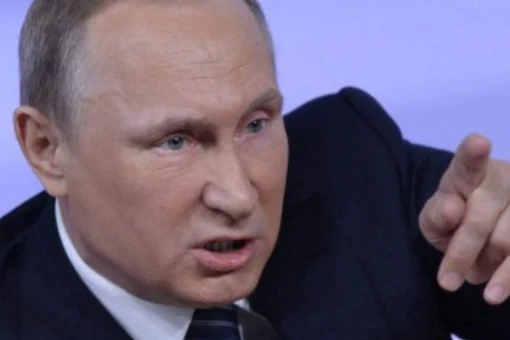According to a recent assessment by the Pentagon’s Defense Intelligence Agency, if vigorous Ukrainian opposition to Russia’s invasion persists, exhausting conventional soldiers and equipment, President Vladimir Putin is likely to threaten to deploy nuclear weapons against the West.
“Protracted occupation of parts of Ukrainian territory threatens to sap Russian military manpower and reduce their modernized weapons arsenal, while consequent economic sanctions will probably throw Russia into prolonged economic depression and diplomatic isolation,” Lieutenant General Scott Berrier, director of the Defense Intelligence Agency, said in its new 67-page summary of worldwide threats.
“As this war and its consequences slowly weaken Russian conventional strength,” Berrier added, “Russia likely will increasingly rely on its nuclear deterrent to signal the West and project strength to its internal and external audiences.”
On the eve of a phone meeting between President Joe Biden and China’s President Xi Jinping, the Pentagon agency gives a bleak assessment of the war’s broader stakes. Biden will seek Xi’s assistance in increasing pressure on Moscow to stop the war, even as US officials struggle to understand China’s position on the conflict.
Putin has already announced that Russia’s nuclear arsenal has been placed on high alert. A request for comment on the Defense Intelligence Agency report was not immediately returned by the Russian Embassy in Washington.
Unlike a report on global threats released by numerous intelligence agencies last week, the latest report reflects facts as of Tuesday.
The invasion is essentially stopped, according to a senior Pentagon officer, with Russia relying on more than 1,000 long-range missile attacks into Ukraine so far.
“U.S. efforts to undermine Russia’s goals in Ukraine, combined with its perception that the United States is a nation in decline, could prompt Russia to engage in more aggressive actions not only in Ukraine itself, but also more broadly in its perceived confrontation with the West,” Berrier said.
Russia’s ambition “to restore a sphere of influence over Ukraine and the other states of the former Soviet Union,” he said, is a primary motivator for the invasion.
“Despite more than expected opposition from Ukraine and rather significant losses in the early phases of the fight,” he continued, “Moscow appears prepared to go forward by employing more lethal capabilities until the Ukrainian government agrees to terms acceptable to Moscow.”




















